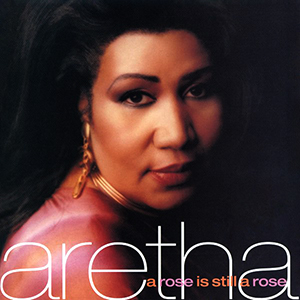
A Rose Is Still a Rose
A Rose Is Still a Rose is the thirty-fourth studio album by American recording artist Aretha Franklin. It was released on March 24, 1998, by Arista Records. Conceived after a longer hiatus and a complete departure from her previous studio album What You See Is What You Sweat (1991), the album includes influences of 1990s hip hop as well as modern-day contemporary R&B and soul music. Throughout the project, Franklin worked with many famed hip hop producers and rappers, such as Lauryn Hill, Sean "Puffy" Combs, Jermaine Dupri, and Daryl Simmons. With the latter acts producing most of the album, A Rose Is Still a Rose deviated from the adult contemporary sound of Franklin's older work.
A Rose Is Still a Rose
March 24, 1998
1997
51:38
- Clive Davis (exec.)
- Dallas Austin
- Louis Biancaniello
- Sean Combs
- Jermaine Dupri
- James Fischer
- Erik "E-Smooth" Hicks
- Lauryn Hill
- Michael J. Powell
- Cory Rooney
- Manuel Seal, Jr.
- Daryl Simmons
- Narada Michael Walden
Most critics praised the album, calling it a return to form for Franklin and ranking it alongside her best late career albums. A Rose Is Still a Rose was nominated for a Grammy Award for Best R&B Album, while its title track earned Franklin her fifth nomination in the Best Female R&B Vocal Performance category. Commercially, the album peaked at number 30 on the US Billboard 200, her highest peak since Who's Zoomin' Who? (1985), and reached the top 40 in Norway, Sweden, and Switzerland. Franklin's biggest commercial success of the 1990s, A Rose Is Still a Rose was certified gold by the RIAA and would remain her final album to earn a certification in the United States.[1]
Background[edit]
In 1991, Franklin released her thirty-sixth studio album What You See Is What You Sweat. A moderate commercial success throughout Europe, particularly in Scandinavia, it became a commercial failure in the United States, peaking at number 153 on the US Billboard 200 and dropping off the charts after seven weeks only.[2] While Franklin remained active the following years, providing songs on film soundtracks such as Malcolm X (1992), Sister Act 2: Back in the Habit (1993) and Waiting to Exhale (1995) and releasing her first compilation album of her Arista Records tenure in 1994, Greatest Hits: 1980–1994, which included two new singles produced by Babyface, no new full-length album was recorded.[2]
Following a string of ill-fated adult contemporary albums, featuring chief production from Narada Michael Walden, Luther Vandross, and others who had helped in revitalizing her career in the 1980s, Franklin envisioned a complete departure from her previous projects for her eleventh album with Arista.[3] It was label head Clive Davis who suggested Franklin to align herself with a contingent of contemporary musicians from the R&B and hip hop scene, who would add to Franklin's soulful foundation without radically detracting it and try to re-connect her with a new audience that was embracing neo soul and hip hop soul artists such as Mariah Carey, Mary J. Blige, Erykah Badu and The Fugees.[3] Davis would become instrumental in consulting producers and songwriters to work with Franklin, including both established and upcoming musicians such as Lauryn Hill, Sean "Puffy" Combs, Dallas Austin, Jermaine Dupri, and Daryl Simmons.[3]
Commercial performance[edit]
Issued in March 1998, A Rose Is Still a Rose debuted at number 30 on the US Billboard 200 and number 7 on Billboard's Top R&B/Hip-Hop Albums chart. This marked Franklin's highest debut position yet as well as her highest peak since 1985's Who's Zoomin' Who?.[2] A steady seller, the album sold 294,000 copies within its first five months of release and was eventually certified gold by the Recording Industry Association of America (RIAA) in August 1998,[2] indicating sales in excess of more than 500,000 units.[1] Her biggest commercial success of the 1990s, A Rose Is Still a Rose would remain Franklin's final album to earn a RIAA certification in the United States.[1] Elsewhere, A Rose Is Still a Rose entered the top forty of the charts it appeared on but was less successful than previous releases. The album debuted and peaked at number 29 on the Swedish Albums Chart,[10] and reached number 32 and number 36 in Norway and Switzerland, becoming her lowest-charting album since 1983's Get It Right on all three markets.[11][12]
A Rose Is Still a Rose produced two singles, led by its same-titled lead single. Franklin's highest-charting single in four years, it peaked at number 26 on the US Billboard Hot 100 and reached number 22 on the UK Singles Chart, marking Franklin's last top 40 hit on both markets until her death in 2018. In addition, "A Rose Is Still a Rose" topped Billboard's Dance Club Songs chart and peaked at number five on the Hot R&B/Hip-Hop Songs. Follow-up "Here We Go Again" also reached number one on Billboard's Dance Club Songs.
Credits adapted from the liner notes of A Rose Is Still a Rose.[13]
Additional Notes